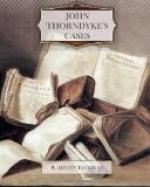* * * * *
Five minutes later Freddy-boy, half asleep, but wholly cheerful, was borne on Thorndyke’s shoulders into the private sitting-room of the Black Horse Hotel. A shriek of joy saluted his entrance, and a shower of maternal kisses brought him to the verge of suffocation. Finally, the impulsive Mrs. Haldean, turning suddenly to Thorndyke, seized both his hands, and for a moment I hoped that she was going to kiss him, too. But he was spared, and I have not yet recovered from the disappointment.
III
THE ANTHROPOLOGIST AT LARGE
Thorndyke was not a newspaper reader. He viewed with extreme disfavour all scrappy and miscellaneous forms of literature, which, by presenting a disorderly series of unrelated items of information, tended, as he considered, to destroy the habit of consecutive mental effort.
“It is most important,” he once remarked to me, “habitually to pursue a definite train of thought, and to pursue it to a finish, instead of flitting indolently from one uncompleted topic to another, as the newspaper reader is so apt to do. Still, there is no harm in a daily paper—so long as you don’t read it.”
Accordingly, he patronized a morning paper, and his method of dealing with it was characteristic. The paper was laid on the table after breakfast, together with a blue pencil and a pair of office shears. A preliminary glance through the sheets enabled him to mark with the pencil those paragraphs that were to be read, and these were presently cut out and looked through, after which they were either thrown away or set aside to be pasted in an indexed book.
The whole proceeding occupied, on an average, a quarter of an hour.
On the morning of which I am now speaking he was thus engaged. The pencil had done its work, and the snick of the shears announced the final stage. Presently he paused with a newly-excised cutting between his fingers, and, after glancing at it for a moment, he handed it to me.
“Another art robbery,” he remarked. “Mysterious affairs, these—as to motive, I mean. You can’t melt down a picture or an ivory carving, and you can’t put them on the market as they stand. The very qualities that give them their value make them totally unnegotiable.”
“Yet I suppose,” said I, “the really inveterate collector—the pottery or stamp maniac, for instance—will buy these contraband goods even though he dare not show them.”
“Probably. No doubt the cupiditas habendi, the mere desire to possess, is the motive force rather than any intelligent purpose—”
The discussion was at this point interrupted by a knock at the door, and a moment later my colleague admitted two gentlemen. One of these I recognized as a Mr. Marchmont, a solicitor, for whom we had occasionally acted; the other was a stranger—a typical Hebrew of the blonde type—good-looking, faultlessly dressed, carrying a bandbox, and obviously in a state of the most extreme agitation.




